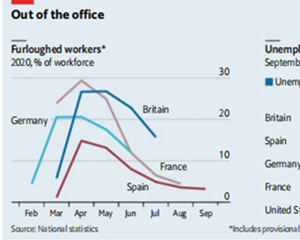Labour markets in Europe
欧洲的劳动力市场
Pain relief
已止痛
The successes of furlough schemes—and their side effects
休假计划的成功及其负面影响
So impressive is Germany's trading prowess that when the coronavirus pandemic struck, it even found something new to export: its short-time working scheme, or Kurzarbeit. Most OECD countries deployed such programmes this year, as they sought to avert mass unemployment and support workers' incomes during lockdowns. Those that had never had them, such as Britain, imported the idea wholesale. Others, such as Spain, drastically expanded access to existing programmes. America, however, went in another direction, preferring to increase the generosity of unemployment benefits.
德国的贸易能力十分惊人,在新冠肺炎袭击之时竟然还能挖掘新的出口商品:即它的“短时工作计划”,或者叫“缩时工作制”。为了防止封锁期间出现大规模的失业并支持工人的收入,今年多数经合组织成员国都部署了这一计划。而那些从未有过该计划的国家,比如英国,直接批发了这一计划。其它国家,比如西班牙,也极大地扩大了对现有计划的访问。只有美国另寻他路,它更喜欢大方地增加失业救济。
In April more than 26m workers in Britain, France, Germany and Spain were on furlough schemes, equivalent to a fifth of the workforce. While America's unemployment rate swelled from just over 3% in February to 14.7% in April, in Europe it barely budged.
4月,英国、法国、德国以及西班牙有2600多万名工人参与了休假计划,该数字相当于劳动力总数的五分之一。同时,该月美国的失业率已经从2月的3%暴涨到了14.7%,而欧洲的失业率几乎没有变动。
A few months on, how has the picture changed? In the big four countries nearly 11m workers were still on job-retention schemes in the summer, or 9% of the workforce. The numbers have fallen dramatically in France and Spain. By contrast, 15% of British workers were still furloughed in July, according to official data, a fifth of whom worked in the hospitality industry. A survey of employers suggests the share of furloughed workers fell to 11% in August.
几个月过去了,情况发生了怎样的变化?今年夏天,这四个大国中仍有1100万名工人(占劳动力总数的9%)处在“短时工作计划”中,而在法国和西班牙这一数字已经急剧下降。相比之下,根据官方统计,英国直至7月份仍有15%的工人在休假,其中有五分之一的人在服务行业工作。一项针对雇主的调查显示,8月休假工人的比例已降至11%。

The furlough schemes were intended to freeze the labour market in place, covering the cost of workers so that bosses facing a temporary cash crunch during shutdowns did not have to sack them, and allowing for seamless recovery once economies reopened. Most people coming off the schemes indeed seem to have resumed work. Unemployment rates have edged up only a little as the number on short-time working schemes has fallen. Workforce participation has so far fallen very slightly, suggesting few were discouraged enough to leave the labour market altogether.
休假计划的目的是冻结现有的劳动力市场,支付工人的成本,这样在停工期间面临暂时现金短缺的老板们就不必解雇他们,并能够在经济重新开放后实现无缝复苏。大多数退出该计划的人实际上似乎已经重新回到工作岗位。随着参与“短时工作计划”的人数的下降,失业率小幅上升。迄今为止,劳动参与度仅略有下降,这表明因受很大打击而彻底离开劳动力市场的人极少。
Despite these successes, though, about 11m workers are still waiting to resume their normal working hours. The longer they are furloughed, the more likely it is that normality is not restored. Yet they have little incentive to find other work. In June economists at Allianz, an insurer, reckoned that up to 9m furloughed jobs in industries such as tourism and hospitality in Europe may be eventually culled.
然而,尽管取得了这些成功,仍有1100万名工人在等待恢复正常的工作时间。他们休假的时间越长,就越有可能无法恢复正常。而且他们也无意去找其它工作。6月,保险公司安联的经济学家估计,欧洲的旅游业和酒店业等行业将有高达900万个被迫休假的工作岗位最终会被淘汰。
This suggests that the true unemployment rate in Europe is probably higher than official figures suggest. As an upper bound, if you were to assume that all of those still on furlough schemes are in fact out of a job, unemployment rates in the big four would rise to 12-20%. America's rate, in contrast, has gone in the opposite direction, falling from its peak in April to just below 8% in September.
这表明,欧洲的真实失业率可能要高于官方显示的数据。作为上限,如果假设所有仍在休假计划中的人实际上都失业了,那么四大国家的失业率将上升到12-20%。与之相反,美国的失业率自4月达到峰值后9月已降至略低于8%。
译文由可可原创,仅供学习交流使用,未经许可请勿转载。












